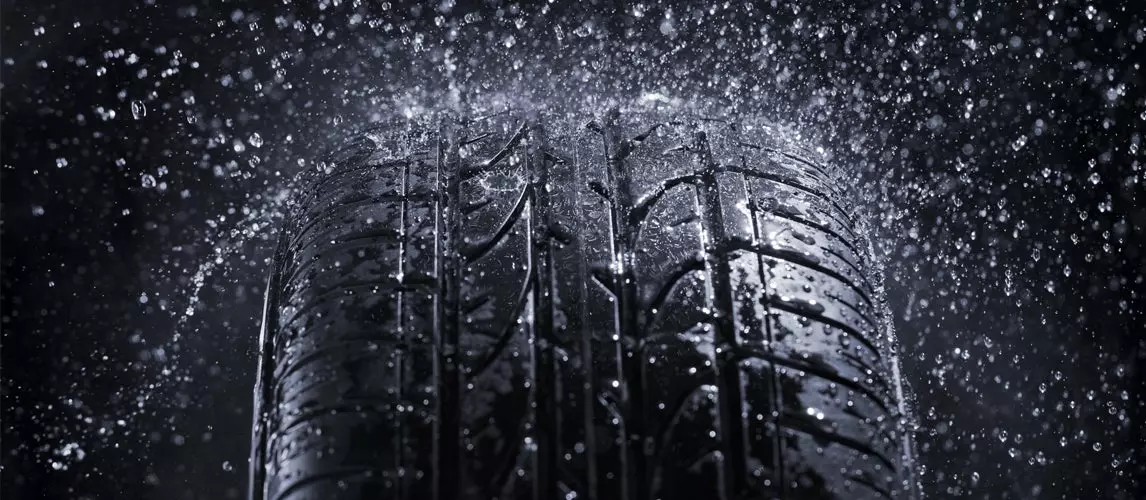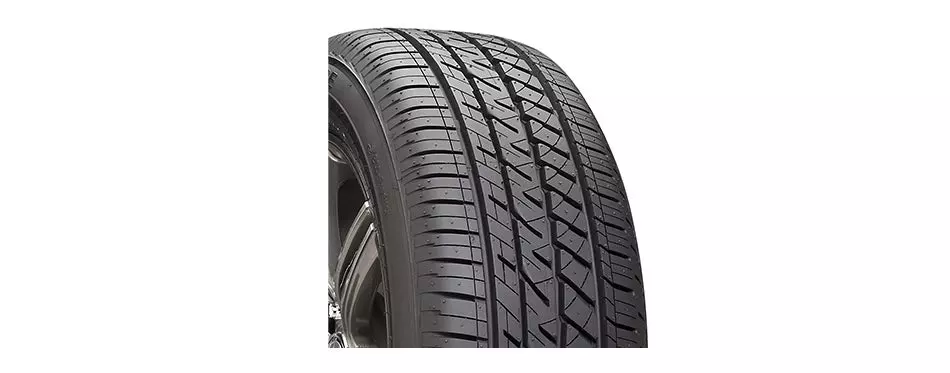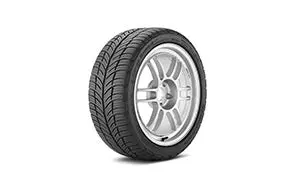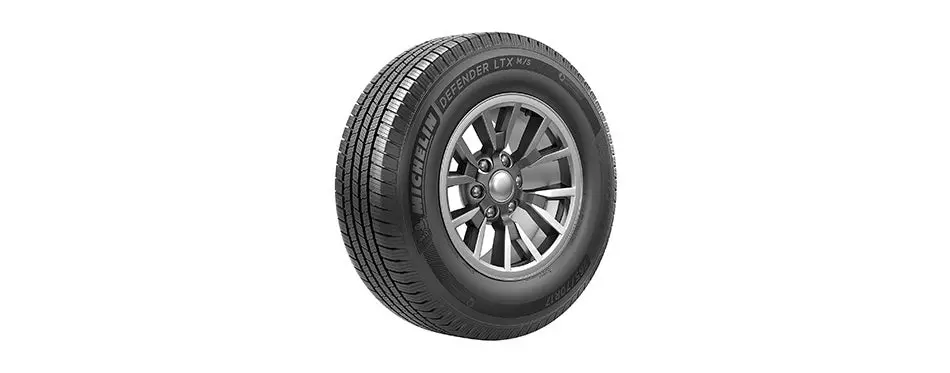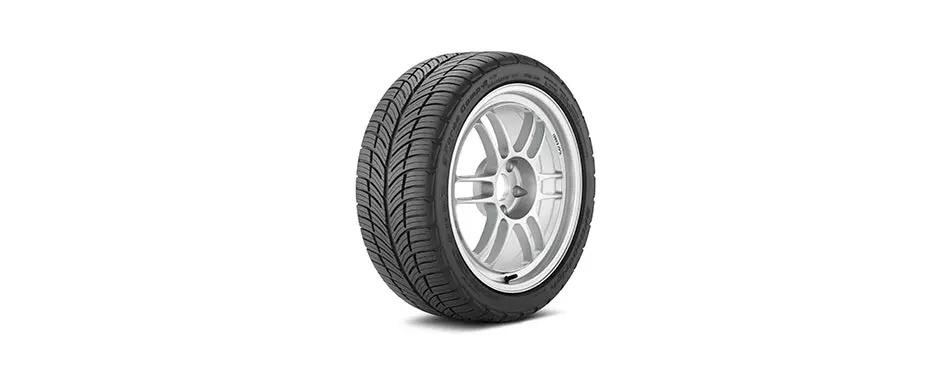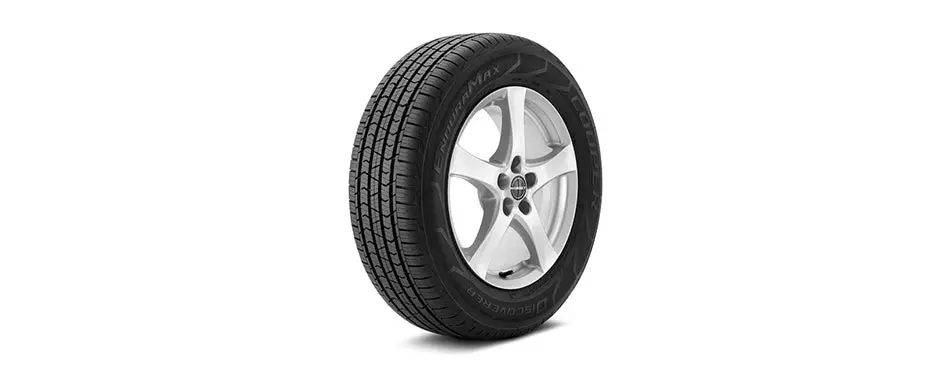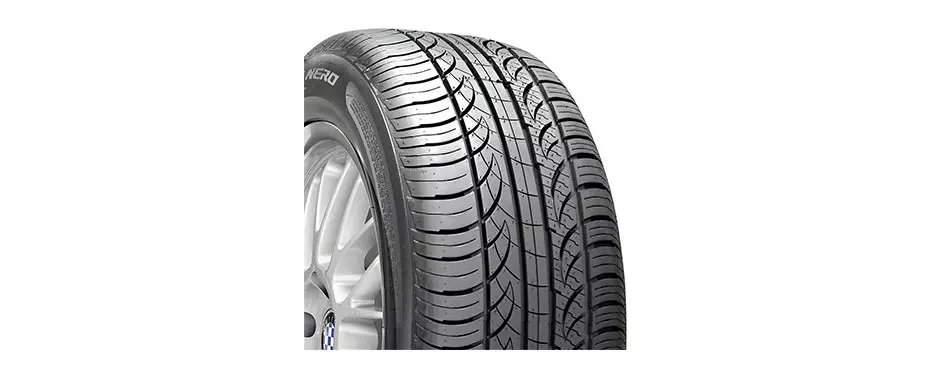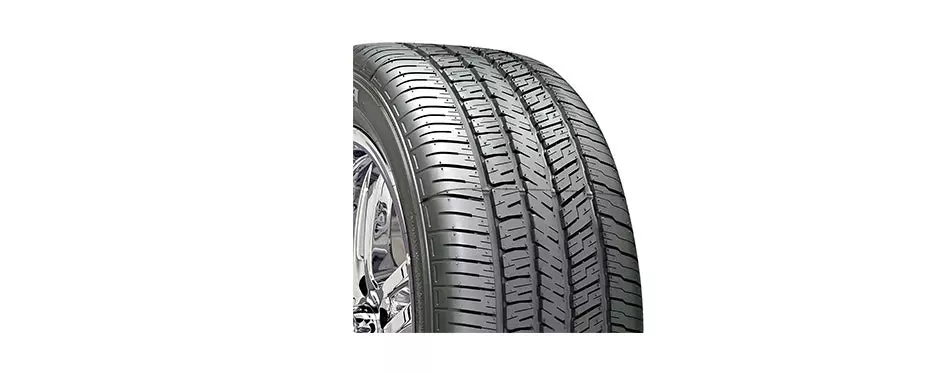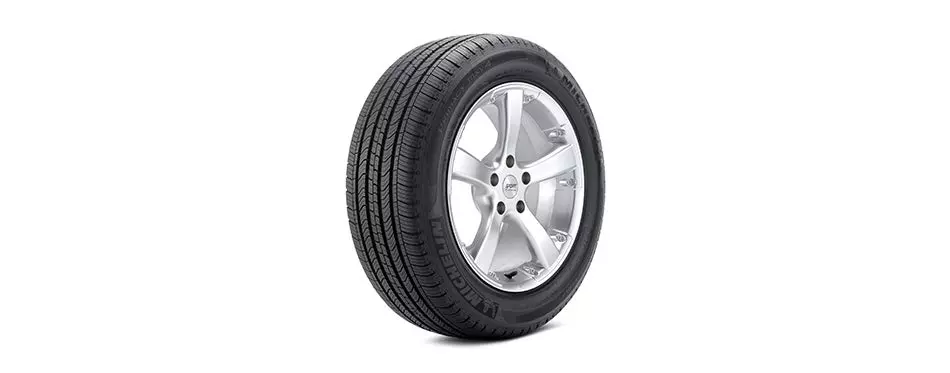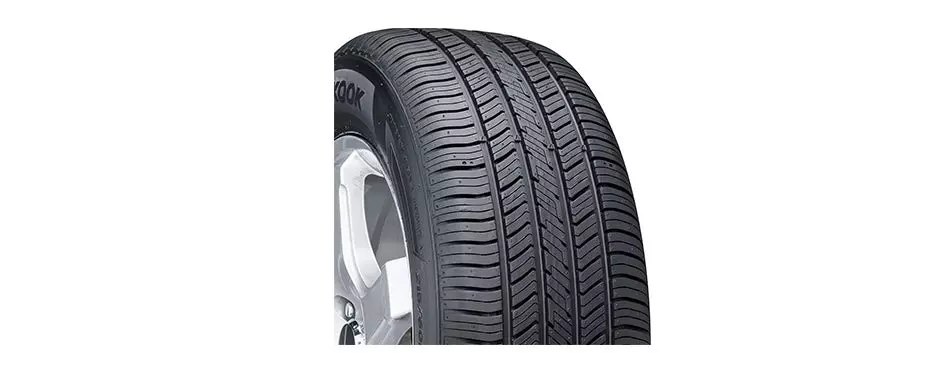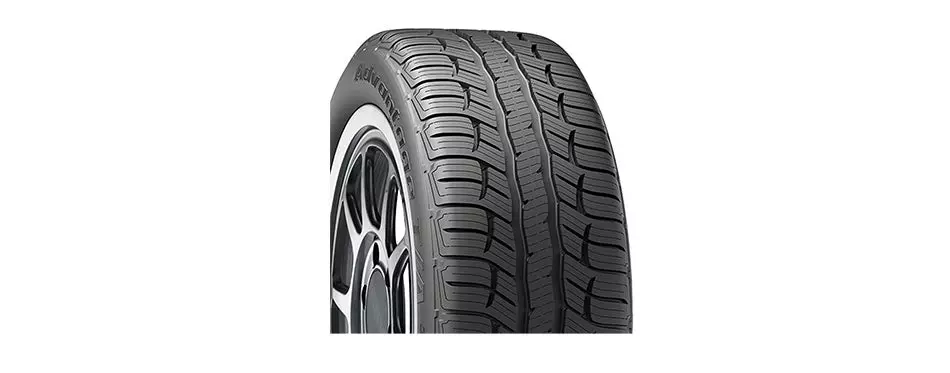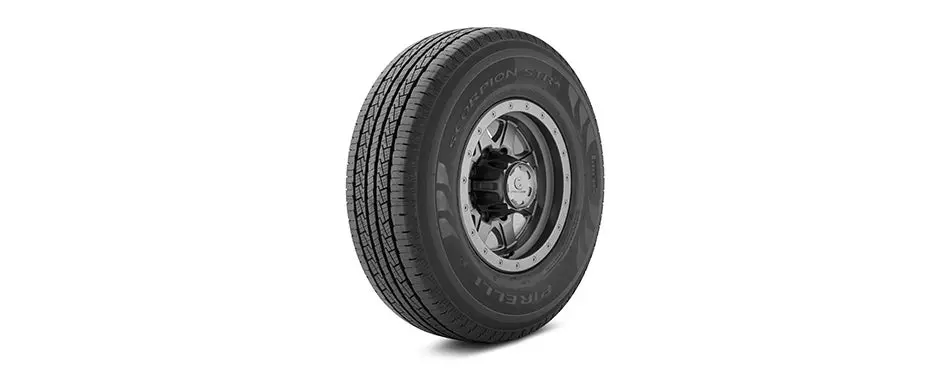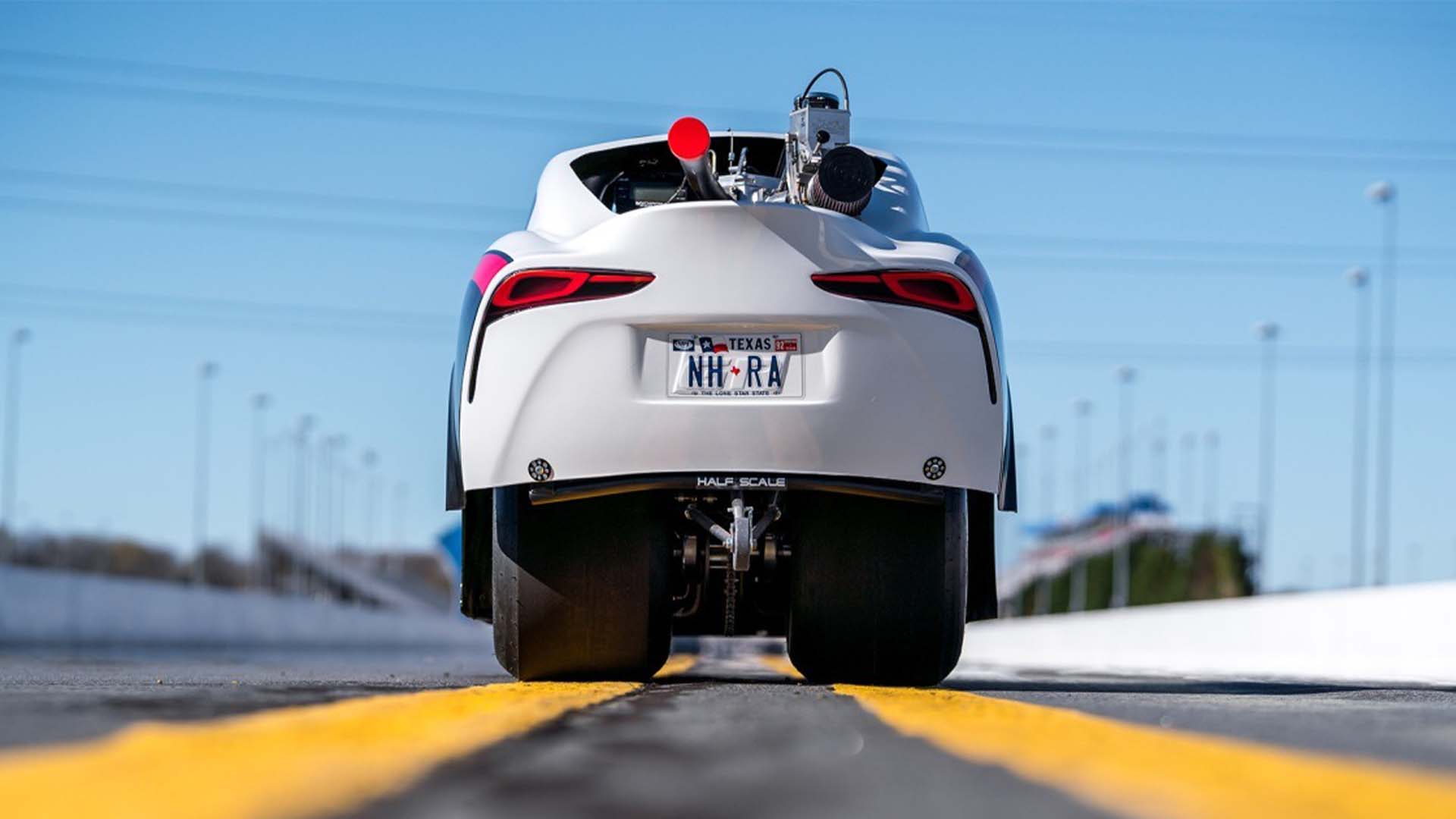- 1. Bridgestone DriveGuard All-Season Tire
- 2. BFGoodrich G-Force COMP-2 A/S
- 3. Michelin Defender LTX Tire
- 4. Cooper Tires Discoverer Enduramax All Season Crossover/SUV Tire
- 5. Pirelli Zero Nero Tire
- 6. Goodyear Eagle RS-A All-Season Tire
- 7. Michelin Primacy
- 8. Hankook Kinergy ST H735 All-Season Tire
- 9. BFGoodrich Advantage T/A Sport LT All-Season Tire
- 10. Pirelli Scorpion Verde
For a select few, purchasing new tires for the car is an exciting and enjoyable task. However, for many, it’s a necessity that just has to be done. In order to guarantee safe driving conditions, limit your risk of a dangerous blowout, and give you the necessary traction and support while driving, you need to regularly replace your tires.
If you’re one of those drivers who only likes to replace their tires when it’s absolutely necessary, and don’t want to mess around with putting on and taking off winter driving tires, a good all-season tire is the perfect solution for you. No matter what type of vehicle you drive, there’s a good, durable all-season tire out there for you. Thanks to our comprehensive product review and buying guide, you’ll be able to confidently select the brand and model that best suits your needs and budget to keep you safe on the road.
The Best All-Season Tires of 2021
If you’re looking for a superhero when it comes to an all-season tire, we have to recommend the Bridgestone DriveGuard All-Season Tire. This tire is an ideal replacement for touring tires on your sedan, crossover SUV, minivan, or wagon. It features a special silica-enhanced compound and an all-season design that delivers the ultimate in traction, control, and precision handling.
This tire goes the distance with run-flat technology that allows you to keep driving up to 50 miles after getting a puncture. An optimized contact area more evenly distributes weight throughout the tread surface for longer wear. The 60,000-mile warranty is no joke, and is quite substantial for this type of tire. These tires can be on the pricey side, though, so be prepared.
- 60,000-mile warranty
- All-season touring tire for sedans, crossovers, minivans, and wagons
- Run-flat technology lets you go up to 50 miles on a flat
- Compatible with rims 15-20 inches in diameter
- Brand Bridgestone
- Model DriveGuard
- Weight 23-45 pounds
Provides a luxurious and smooth ride
Excellent handling and traction
Has a long warranty
Can be a bit pricey
Not suitable for light trucks or larger SUVs
Give the performance of your sports coupe or sedan a boost with these ultra-high performance all-season tires. The high silica rubber compound and aggressive tread pattern help you to accelerate faster, brake quicker, and have better control through the corners. Unlike summer tires, the compound for this tire remains flexible in cold weather. The tread pattern is V-shaped with angled lateral and longitudinal grooves. The wrap-around tread blocks and their squared-off shape give the tire some rigidity for more stability while cornering. A standout feature of the tire is the inclusion of BFGoodrich’s Equal TEnsion Containment System (ETEC System) that features spirally wrapped nylon and twin steel belts.
The drawback of this tire is that it doesn’t have the smoothest ride. You sacrifice cushioned comfort for better performance. The tire tread also wears quicker, but this is partially due to the driver’s more aggressive driving with the increased performance capabilities of the tire.
- Cold weather high silica rubber compound
- Wrap around tread blocks
- Nylon and steel belt construction
- V-shaped tread pattern
- Brand BFGoodrich
- Model G-Force COMP-2 A/S
- Weight 22-30 pounds
Faster acceleration
Shorter stopping distance
Stable cornering
Less comfortable ride
Faster tread wear
Highways and city roads don’t stand a chance against your car riding on your new Defenders. You get a 70,000-mile warranty and excellent performance in dry and wet traction conditions. These tires come with one of the best UTQG ratings available and boast an immense total load capacity at over five tons.
You’ll enjoy driving on these tires because they increase your traction on both dry and wet roads. They’ll also improve your fuel economy, just be sure to maintain your tire pressure, so you get the maximum benefit. They also have MaxTouch, a construction method to these tires, and creates a contact patch for the ideal rolling resistance and durability.
- 2,535 / 10,140 total load capacity
- UTQG of 800 A A
- For vans, pickups and sport utility vehicles
- 275/55R20 113T
- Brand Michelin
- Model Michelin Defender LTX
- Weight 39 pounds
Great warranty
Top notch wet performance
Increased fuel economy
Off-road performance severely lacks
Handles similar to a performance tire
Short tread life
Outfit your crossover or SUV with this all-season tire. You’ll confidently drive throughout the year with a rubber compound that’s designed to give you traction in warm weather and on light snow. This tire stands out because it also meets the industry requirements for severe snow driving. It has the three-peak mountain snowflake symbol. The construction of this tire includes Cooper’s Durable-Tread Technology, which helps it resist abrasion, chips, and cuts. The symmetric tread pattern helps the tire to be quieter. The four-wide circumferential grooves in the pattern channel water away from the tire for better traction.
Unfortunately, the performance of this tire declines as your driving speed increases. This makes the tire better for city driving and less than ideal for highway driving. They also lack durability in the sidewalls, which can lead to punctures.
- Durable-Tread technology
- Symmetrical tread pattern
- Four circumferential grooves
- Winter Grip technology
- Brand Cooper Tires
- Model Discoverer Enduramax
- Weight 28 pounds
Three-peak mountain snowflake (3PMSF) symbol
Quiet ride
Armor Belt Technology
Sidewalls lack durability
Speed decreases performance ability
Unique to these all-season tires is their noise-canceling system that’s integrated into the inner lining of the tire. This plays a role in reducing that whirring noise you hear while driving, all while improving fuel economy. Their tread compound is greatly enhanced by silica, aiding in high temperature[ air pressure control](../best-tire-pressure-gauges-reviewed/).
This all-season tire has surprisingly great handling on off-road areas, though they perform horribly with even a light dusting of snow on the ground. With an average load capacity on your tires, we would have liked to see a standard warranty as well. Overall, these inexpensive tires are an excellent addition to your vehicle.
- 1,565 / 6,260 total load capacity
- UTQG of 400 AA A
- For cars in all weather conditions
- 245/40R18 97V
- Brand Pirelli
- Model Zero Nero
- Weight 29 pounds
Improved fuel economy
Inexpensive set
Unique tread pattern handles decently off-road
Poor winter performance
Warranty limitations are lacking
Loud road noise
Goodyear has long been a well-respected manufacturer of durable and reliable tires, and the Goodyear Eagle RS-A All-Season Tire is a prime example of why. This tire delivers responsive handling and reliable traction in almost any type of road conditions. This tire is actually a trusted choice of many police forces throughout the United States, so that’s saying something. However, we don’t love that they aren’t backed by any warranty.
With this tire, you get maximum road contact and a specialized groove pattern that efficiently shunts water out from underneath it to ensure a rugged grip in even some of the wettest conditions. Aggressive shoulder tread blocks also give you strong and confident cornering capability. These tires are also offered at a reasonable price point that is much more budget-friendly than some others on the market. These tires come in a wide range of sizes that make them compatible with trucks, SUVs, sedans, crossovers, minivans, and even compact cars.
- Fits a wide variety of vehicles from compact cars to trucks
- Includes run-flat technology
- Asymmetric tread design provides confident traction
- Aggressive shoulder tread blocks deliver excellent cornering capability
- Brand Goodyear
- Model Eagle RS-A
- Weight 17-43 pounds
Compatible with most vehicles
Excellent handling and performance in wet and snowy weather
Decent price point
No warranty
Tread may wear down faster than expected in demanding conditions
Rain and light snow don’t stand a chance in your Primacy set of tires. Capable of supporting over 5,000lbs in total load capacity and rocking a superior UTQG rating, these tires offer you internal steel belts for added durability. Excellent dry road traction lowers treadwear while improving your fuel efficiency.
BAZ technology improves your high-speed handling and performance, which can all be equipped to your sedan, minivan, or crossover vehicles. For an excellent all-around replacement price, you get immeasurable quality from one of America’s most-trusted names in tires: Michelin.
- 1,279 / 5,116 total load capacity
- UTQG of 620 A A
- BAZ technology
- 5,000 lb capacity
- Brand Michelin
- Model Primacy
- Weight 20 pounds
Excellent warranty
Surprising handling in 1/4-1/2” snow
Slow treadwear
A bit of road noise
Cracking along sidewalls
Fast treadwear
Just because you’re on a tighter budget than some doesn’t mean you don’t deserve a reliable and rugged all-season tire. That’s where the Hankook Kinergy ST H735 All-Season Tire is a great option for you. This tire comes with an impressive 70,000-mile warranty that guarantees you a comfortable ride for a long time to come. This tire is compatible with most vehicles, whether you have a truck, SUV, sedan, or compact car. It’s not the greatest for sports cars or sport models, as it’s more of a touring tire.
Wide lateral grooves in the tire’s tread provide you with confident and excellent snow traction and braking in wet conditions. Additional notch sipes provide biting edges for all-around reliable performance in almost any type of weather. Some users report that they don’t ride as quietly as some more expensive models, but it’s not a big enough issue to outweigh the excellent price of these tires.
- 70,000-mile warranty
- Fits rims 13-17 inches in diameter
- Exceptional wet braking and snow traction
- Brand Hankook
- Model Kinergy ST H735
- Weight 14-27 pounds
Affordable
Long 70,000-mile warranty
Wide circumferential grooves efficiently remove water
Pricey to replace the whole set
Terrible in winter/snow handling
Uneven tread wear
A fun, smooth and reliable all-season option for your light truck, SUV, or crossover is the BFGoodrich Advantage T/A Sport LT All-Season Tire. Get responsive handling and outstanding grip thanks to the silica-infused compound of this tire’s tread. Locking active sipe technology gives you a serious bite in wet or snowy conditions. As well, the Aqua-Fuel Technology aids in rapid water dispersion.
This rugged and reliable tire exceeds RMS severe snow traction performance requirements, giving you up to 30 percent better snow traction than with leading competitors. As an added bonus, the Advantage T/S Sport LT is equipped with BFG’s ETEC System that allows the tire to maintain its shape and footprint during high speeds and on sharp corners. This tire comes with a 65,000-mile warranty for added peace of mind. Keep in mind, though, that this tire isn’t meant for sedans, wagons, compact cars, or sports cars.
- Suitable for light trucks, SUVs, and crossovers
- 65,000-mile warranty
- AquaFlume technology disperses water from under tires
- 3D Active sipes
- Brand BFGoodrich
- Model Advantage T/A Sport LT
- Weight 28-41 pounds
Excellent warranty
Deep tread pattern and depth
Improved hydroplaning performance
No run-flat technology
Noisy compared to some other models
Pirelli produces quality while focusing on keeping your initial cost on the lower side. This tire has high-speed performance on turns and stability when driving on dry roads. Between city and highway, you’ll get close to their 65,000-mile warranty.
This tire is phenomenal in the rain and handles well enough off-road. The unique tread pattern keeps you stable, riding easy, and most of all, these tires keep money in your pocket.
- 2,149/8,596 total load capacity
- UTQG of 740 A A
- 65,000-mile warranty
- For light trucks and sport utility vehicles
- Brand Pirelli
- Model Scorpion Verde
- Weight 4.4 pounds
Superb warranty
Excellent price
Improves fuel economy
Poor winter/snow performance
Produces whirring sound
Weak sidewalls
All Season Tire Buying Guide & FAQ
When it comes to tires, it’s never “One-size-fits-all,” even with all-season tires, which are designed to be more universal than many other tire models on the market. Their similarities and slight differences are what makes it so hard to decide what the best all-season tire is to suit your specific needs and requirements. The following buying guide will take you through the ins and outs of all-season tire buying so you’re not just wasting your money and risking your safety on a product that doesn’t deliver on its promises.
Should I Invest In All-Season Tires?
All-season tires are a great, versatile addition to most vehicles. Not only do they offer excellent value because they can be used in any season, but they also come at a variety of price points. An all-season tire could be the perfect fit for your vehicle, not to mention saving you time, money, and the hassle involved in switching to your winter driving tires each winter season. The best way to determine whether these are the right tires for your needs is to consider the following questions.
Poor handling while driving is due to a number of factors, all of which usually point to you needing new tires. Uneven tread wear, the wrong size of tire, treads that are too low, and improperly inflated tires are all reasons why your vehicle may not handle as well as you want. Damaged tires or rims from hitting curbs or potholes and misaligned tires are a couple of other factors that can negatively affect your car’s handling.
Trouble driving in wet weather can usually be chalked up to the fact that your tires may have worn treads that don’t dissipate water as well as they should or did when they were new. Measuring tread depth will help you determine if you need to invest in new tires that provide more sure and stable traction on wet roads.
Has it been a while since you changed your tires for a completely new set? If so, then it’s likely your current tires are no longer under warranty. Once your tires have reached a certain number of years or miles on the road, they’re no longer covered against damage or wear and tear like lost tread. Fortunately, a new set of all-season tires can include an excellent warranty. Some tires offer warranties as high as 90,000 miles, which ensures you’ll be able to confidently rely on them.
Benefits of All Season Tires
- Improved Traction: All season tires have tread patterns that use a combination of designs. This helps to maintain traction when driving in a variety of climates and weather conditions. It also helps to maintain control of your vehicle on dry, wet, and snowy roads.
- Dependability: All season tires are designed to perform, giving you confidence that your tires will reliably perform. You’ll be able to drive your vehicle throughout the year and in a variety of conditions without having to worry about your tires failing you.
- Fuel Economy: When you buy the right set of all-season tires, you can improve the performance of your vehicle. The tires can help you achieve better fuel economy. This can reduce your fuel costs.
Top Brands of All Season Tires
BFGoodrich
Founded in 1870 in Ohio, BFGoodrich is one of the most well-known names for tires worldwide. The company began as a synthetic rubber company. Today, it continually researches and develops new and innovative tire designs. The BFGoodrich Radial T/A Performance All-Season Tire will give you a cushioned ride and reliable performance.
Bridgestone
Founded in 1931 in Japan, Bridgestone has become one of the most widely used OEM tires. It is the OEM tire for Toyota. The company produces quality tires in a range of sizes, making them a trusted and reliable brand. The Bridgestone Driveguard will give you plenty of traction on wet and dry roads.
Michelin
Founded in 1889 in France, Michelin produces tires for almost every purpose. You’ll find them on race cars and airplanes. The company also produces the Michelin guides, which have been published for over a century. Experience the quality for yourself with the Michelin LTX M/S2 All-Season Tire.
Pirelli
Founded in 1872 in Italy, the Pirelli name has grown from being a performance and racing tire to a worldwide consumer tire. Its line of tires has a reputation for quality and impressive performance ability. The Pirelli Cinturato All Season Tire will give you the traction necessary for owning the road.
Goodyear
Founded in 1898 in Ohio, the Goodyear name is the oldest name in tires. Today it distributes its tires worldwide and is the OEM tire for several models. The company strives to stay at the forefront of development and innovation. Try a set of Goodyear G614 Tires on your vehicle.
All Season Tires Pricing
- Under $150: You can easily find a quality tire in this price range. It will have a basic tread pattern and one or two circumferential grooves. The rubber compound will be durable.
- $150 to $200: Tires in this price range have a slightly better rubber compound and tread pattern. You may find these tires to perform better in harsh winter weather. They may also be quieter while on the road.
- $200 and up: Tires in this price range are considered high-end with innovative rubber compounds, specialty tread patterns, and better performance in extreme weather. These tires may have additional ratings beyond the standard all-season rating.
Types & Factors to Consider When Buying All Season Tires
With any purchase, there are a few factors to consider when choosing your next all-season tire.
- Load Capacity: A standard car runs about 4,000lbs, and between the four of your tires, you need enough to handle that, plus passengers, plus some cargo. Our top all-season tires give you a max load of 1,653lbs per tire, or just over 6,600lbs in total. Basically, don’t transport a bunch of cinder blocks in the trunk of your sedan, and you’ll be fine.
- UTQG: This stands for Uniform Tire Quality Grade. Composed of various elements, such as treadwear, traction and resistance to temperatures, this metric measures the safety rating of your tires, and their overall quality.
- Fuel Economy: According to Bill VandeWater, an auto expert at Bridgestone Firestone North America, you can see as much as a 20 percent increase in your miles per gallon by choosing the appropriate tires for your vehicle. Look for a tread compound that has a low rolling resistance.
Other Considerations
- Rubber Compound. The rubber compound is the formula used for the material that constructs the tire. The formula and the amount of silica added will dictate how the rubber performs in different driving conditions. Look for a tire that will stay flexible in your region’s cold winter weather. It also shouldn’t get too soft in the hot summer weather.
- Tread Pattern. This is the design that the rubber is shaped into on the face of the tire. It will be either a symmetrical or asymmetrical pattern. Some patterns will wrap around the shoulder and reach the start of the sidewall. This feature increases traction and stability in the corners. Large circumferential grooves help evacuate water away from the tire for better traction.
- Size. Look at the size printed on your current tires and use this to know the size you should buy for your next set. Do not deviate away from this size unless you are buying new wheels in a different size. The size code will dictate the width and diameter of the tire. Buying a tire that is too large or too small will put you at risk of the tire popping off the wheel while driving.
How We Tested All Season Tires
When testing all-season tires, we want to see how they perform in all weather conditions. The term all-season implies that the tire should reliably perform throughout the year in a variety of weather conditions. The rubber compound should stay firm in warm weather so as not to wear out too quickly. It also needs to stay flexible in cold weather to maintain traction. The tread pattern needs to feature a combination of designs to handle everything from summer rains to winter snow. There should be large circumferential grooves, shaped tread blocks, and sipes.
The tire should be long-lasting and improve the performance of your vehicle. The tread pattern can influence how loud the tires are and how smooth your ride is. You’ll also want to look at how the tire affects fuel economy. Some tires can improve fuel economy while others can reduce it. Finally, it’s important to look at how long the tire lasts. A tire may have impressive performance, but the tread may wear away too quickly.
Understanding the Design of All Season Tires
All-season tires are a very focused piece of equipment for your car. They’ve been designed to work perfectly between the realm of safety and performance, all while remaining durable and versatile. For the common commuter, the weekend warrior, and the busy dads out there, all season tires provide the perfect blend of safety in adverse weather conditions.
That being said, when the newscasters say to stay out of the snow, your all season tires are really not meant to handle those conditions, and you should abide by the weather forecast. We all know the weatherman is wrong (a lot), but your all season tires were not designed to handle snow and ice. It’s best to plan ahead or equip your other vehicle with snow tires.
Types of Tread Patterns, Performance, and How Long They Last
Ever wondered why your treads are the way they are? It’s not by accident or just to “look cool,” they all serve their own functions. Let’s get into it.
- Unidirectional: Designed to move in a single direction. These are standard on most cars, and they require rotations more than any other type. They’re only set to move in one way, one direction, so they wear down a lot faster on key points. Ever thought that getting your tires rotated was just a scheme for mechanics to get more money? Well, there’s actually a reason.
- Symmetrical: Able to be rotated in different ways, these last for a really long time (on average). Due to the groove patterns, you’re able to even out the wear-and-tear on these tires, so you don’t run through them too quickly.
- Asymmetrical: You’ll find these on muscle cars and sports cars. These combine a few different tread pattern standards to give you excellent grip, especially if you’re driving at a high speed. You get an excellent grip on both wet and dry surfaces.
Are All Season Tires Good in Snow?
There’s a big misconception between the terms all season, and snow (or winter) for your tires. They are most definitely not good in snow. Here’s a summary for each tire type to better point out their primary differences:
- All Season Tires: Perfect for wet roads and slippery trails, these are the best option for summer road trips without having to worry about a rainstorm on the GPS getting in your way. This also means that light bits of snow or slush on the road aren’t going to stand a chance against your new tires, but don’t push the envelope. Pushing through a bit of slush is alright, but when the roads haven’t been plowed yet, your all-season tires are going to know it.
- Snow (Winter) Tires: Icy roads, snowfall, and some wet inclement conditions are the perfect opponent for winter tires. If your home is set far back on your property and you’re not planning on snow blowing or shoveling your entire driveway to the road (and nobody could blame you), you’ll need tires that are going to get over all of that mess. That’s where snow tires come in; they have a tread compound and pattern to maximize tread life and traction.
You May Also Like: Tire Size Calculator
Sources:
- Winter & Snow Tires vs. All Season Tires – Bridgestone
- Tire Tread Patterns – What do the Different Patterns Mean? – Pep Boys
- Tire Tread Patterns – Tire Rack
- Carefully Consider Fuel Economy – HowStuffWorks
